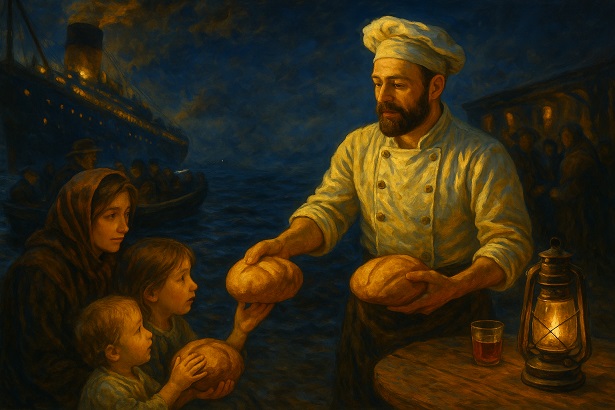The Quiet Hero Who Floated Through the Storm
When the Titanic began its final descent into the black, frigid depths of the North Atlantic, panic erupted like wildfire. Screams pierced the night, lifeboats filled too fast, and hope clung to wood and desperation. But amid the chaos, one man stood calmly against the tide—not a captain, not an officer, not a man of rank—just the ship’s baker, Charles Joughin.

He wore no epaulettes, blew no whistle, and commanded no orders. But what he carried was far more powerful: a life devoted to care, and hands that had fed hundreds now moved with quiet resolve. While others fled, Charles gathered armfuls of bread—not for himself, but for the frightened women and shivering children. He handed out food like lifelines, urged the uncertain into boats, lifted the weak with gentle strength, and never once asked for a spot on board. When the last boat floated away into the cold darkness, he remained behind.
He didn’t cry. He didn’t beg. He returned to his cabin, poured a stiff glass of whiskey—not as a final toast, but as a moment of stillness before the end. And then, as the mighty Titanic groaned and broke apart, Charles plunged into the freezing sea… and lived.
For over two hours, he drifted in the deadly cold. Science would call it impossible. But Charles didn’t die. He didn’t freeze. He didn’t let go. Not because of whiskey—alcohol accelerates death in icy waters—but because of something much deeper: a composed soul, years of hard work, a baker’s strength, and a heart that refused to surrender.
He never sought glory. He never made speeches. He simply did what he had always done: looked after others. In a night when legends were born and lives were lost, it wasn’t a roaring voice that made the difference—it was the quiet man who kept people alive with bread, kindness, and courage.
Sometimes, the true heroes don’t stand in the spotlight.
They stand in the cold.
And they float.
